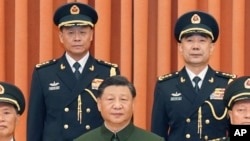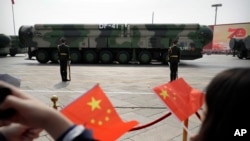Chinese President Xi Jinping, also the military’s commander-in-chief, this week replaced two leaders of the elite force overseeing the People’s Liberation Army’s conventional and nuclear missiles.
The reshuffle at the PLA Rocket Force suggests a marked shift in Xi’s nuclear strategy toward the so-called “nuclear triad” — a three-pronged force that enables nuclear missiles to be launched from the air, sea and land — under an integrated command system, analysts warn.
That will help strengthen China’s nuclear deterrent capabilities and thus pose a greater threat to U.S. security, they say.
Nuclear triad
Xi, on Monday, appointed Wang Houbin, former deputy commander of the navy, and Xu Xisheng, former political commissar of the air force’s Southern Theater Command, to serve, respectively, as the rocket force’s commander and political commissar.
“What has happened is that, in order to have a modern and effective nuclear deterrent, is to have what is called the nuclear triad. So, three ways of delivering nuclear missile or nuclear deterrence … This is more about putting nuclear weapons on planes, on submarines and not necessarily on land-based missiles,” Alexander Neill, a Singapore-based adjunct fellow at the think tank Pacific Forum, told VOA Mandarin by phone on Tuesday.
Neill said that China, in order to be a modern nuclear power with aggressive and offensive capabilities, has to acquire the ability to launch nuclear weapons from various positions – something that will keep its enemy guessing.
Fresh leadership
Wang and Xu will replace their predecessors Li Yuchao and Xu Zhongbo.
Li and his two former deputies Zhang Zhenzhong and Liu Guangbin reportedly were detained in an anti-corruption investigation.
Xi’s selection of former navy and air force leaders to head up the rocket force suggests he is building a unified command system that will combine nuclear weapon arsenals across three armed forces, said Chang Ching, a research fellow at the Taipei-based Society for Strategic Studies.
“[The PLA] will eventually integrate the navy’s and the air force’s nuclear defense and offense capabilities. This is an inevitable trend. I believe that nuclear weapons-related officers from both the navy and the air force have already served in the rocket force before the top leadership reshuffle. China’s finally moving toward a nuclear force with a unified command structure,” Chang told VOA Mandarin by phone Tuesday.
He said there’s speculation about whether Wang had experience with the navy’s nuclear missile unit or Xu with the air force’s bomber squadron, which if true, would bolster the assertion of a combined approach.
Absolute loyalty
Neill said if China is diversifying its nuclear program, Xi is demanding “absolute loyalty” across the PLA to the Communist Party under his reign, especially from those who could end up pressing the nuclear button.
That’s why Xi launched the latest round of his anti-graft campaign, although corruption remains a deep-rooted problem with which the party is struggling, he added.
However, Yao Cheng, a former PLA navy officer who fled to the U.S. in 2016, argued that Xi has likely lost control of the rocket force and asserted the PLA is increasingly reluctant to pledge allegiance to the Chinese leader.
Yao called Xi’s anti-graft purges “selective,” which has snared hundreds of military officers in his 10-year rule and turned a great number of generals against Xi. Many are hence unwilling to fight Xi’s war, he said.
Lost controls?
Yao also called the rocket force’s incoming commander Wang, whom he served with in the navy, an “incompetent” leader.
“He’s someone who is obedient and follows the boss’s lead. His weakness is that he has long served as a staff officer, who has never led troops and lacks specialties. He can’t possibly manage the rocket force well because, for one, he’s an amateur whom the elite force will be unconvinced with and look down on,” Yao told VOA Mandarin via Zoom on Tuesday.
Yao was the first in late June to reveal the force’s outgoing commander, Li, was under investigation for corruption, after people close to the matter told him that Li’s son might have leaked secrets to the U.S.
He said that Ju Qiansheng, commander of the PLA Strategic Support Force, also was under investigation.
Yao said he believes senior officers of the rocket force leaked intelligence to the U.S. to expose locations and functions of the force’s nine bases. Information on the bases was included in a 255-page report released last year by the China Aerospace Studies department at the U.S. military’s Air University.
Yao contends these are all signs that PLA officers are fearful of the prospect of a war between China and the U.S. over Taiwan.
This article originated in VOA’s Mandarin Service.





